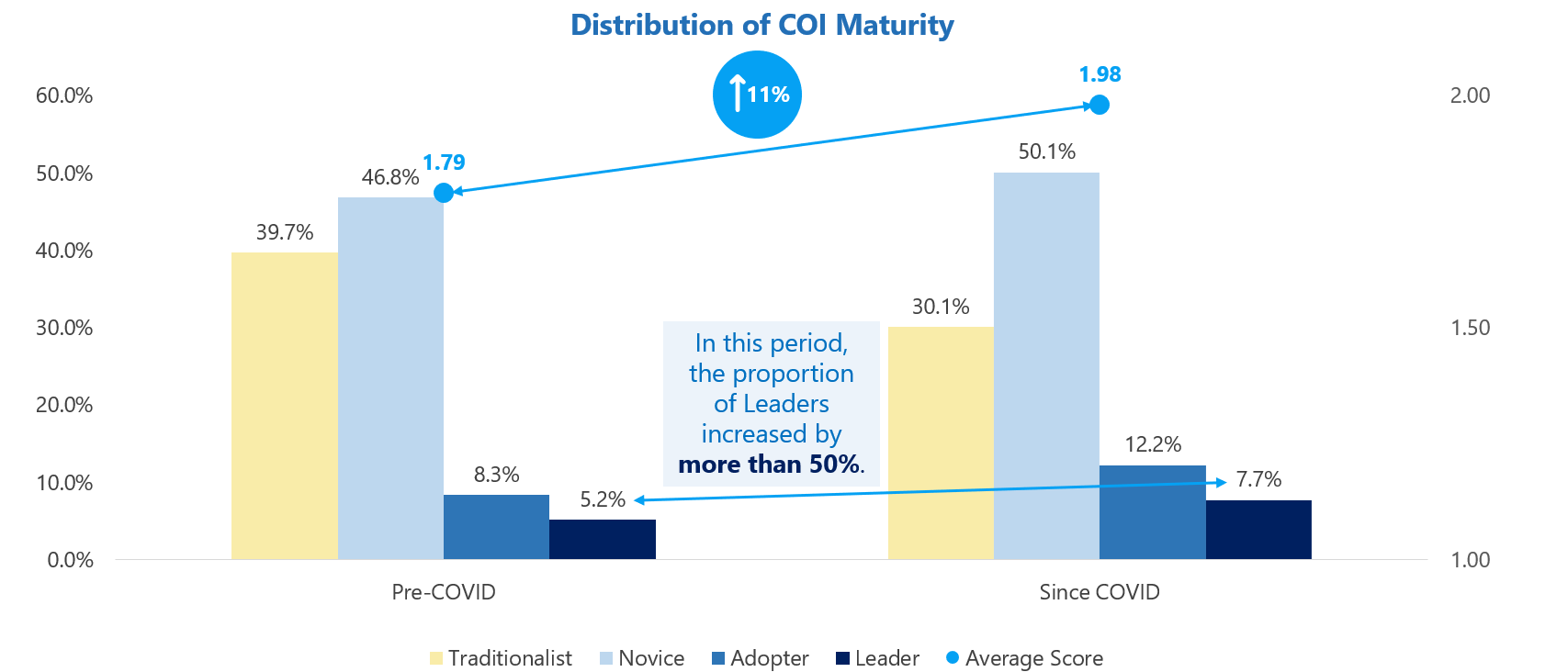- 74% of all business decision-makers in Asia Pacific say innovation is now a ‘must’, not just a good to have; they see the ability to innovate as vital to performance and resilience, according to a new Microsoft-IDC study[1]
- Almost all (98%) leading organizations[2] with the most advanced culture of innovation share the same belief that innovation is key to responding quickly to market challenges and opportunities; they are more resilient to crises like the current pandemic, and expect to recover faster
- 50% more leaders[2], in comparison with other organizations, expect to grow their revenue in 2020
- 1 in 3 leaders[2] expect to increase their market share despite the pandemic
- 45% of leaders[2] believe that their organizations will recover from the COVID-19 crisis in six months or less
Singapore, 10 Sep 2020 – As the region continues to deal with the disruptions resulting from COVID-19, 74% of organizations in Asia Pacific say that innovation is now a ‘must’ for them to respond quickly to market challenges and opportunities, and ensure business resilience. In fact, almost all (98%) organizations with the most mature culture of innovation (leaders)[2] agree that innovation is a necessity to stay resilient during a crisis.
Leveraging their ability to innovate, leaders[2] proved to be more resilient and able to recover faster. Almost half of them believe that they will recover from the pandemic in six months or less. In fact, 50% more leaders, as compared with the rest of the organizations surveyed, expect an increase in their revenue, and one in three of them expect to increase their market share despite the crisis.
“As the saying goes, necessity is the mother of invention. We have witnessed first-hand, how the wave of transformative change has swept across the region. This is no easy feat; organizations have challenges to overcome and innovation is no longer a luxury – it has to form the core part of their DNA. It has become critical to adapt quickly and ensure business continuity and future relevance,” said Ahmed Mazhari, President, Microsoft Asia.
“Organizations across Asia Pacific realized how much their ability to innovate fuels their performance and business resilience during the crisis. They were also forced to innovate and accelerate transformation in response to the challenges and new market conditions. Doing so, they have learned it is not as hard as they had anticipated. Nearly half (48%) of organizations in the region now say they find it easier to drive innovation, compared to a quarter (27%) of them before COVID-19,” explained Sandra Ng, Group Vice President, Practice Group, IDC Asia/Pacific.
These findings were released by Microsoft in its latest study with IDC Asia Pacific, which surveyed 3,312 business decision-makers and 3,495 workers across 15 markets in Asia Pacific within a six-month period, before and since COVID-19. Titled “Culture of Innovation: Foundation for business resilience and economic recovery in Asia Pacific”, it uncovered how organizations can successfully fuel business resilience and performance through innovation.
The study also introduced the Culture of Innovation framework, which spans the dimensions of people, process, data, and technology, to assess organizations’ approach to innovation. It also provides guidance to help organizations progress to the mature stage and respond to challenges and recover faster, to improve their performance.
Fig. 1: Culture of Innovation Framework
“We first commissioned this research to gain a better understanding of the relationship between an organization’s culture of innovation and its ability to grow. We now see clearly that maturity in a culture of innovation also plays a key role in shoring it up against risks and economic headwinds and setting the path for recovery”, explained Ahmed Mazhari.
Assessing organizational maturity for culture of innovation
The culture of innovation maturity framework captures organizations’ approach to innovation. Through the research, organizations’ performance was mapped against four dimensions (people, processes, data, and technology), with organizations grouped in four stages – traditionalist (stage 1), novice (stage 2), adaptor (stage 3), and leaders (stage 4). Leaders comprise organizations that are the most mature in building a culture of innovation[1].
The study found that in the span of six months, organizations in Asia Pacific have matured in the culture of innovation by 11%, an indication that they have increased their ability to innovate.
 Fig 2: Culture of Innovation Maturity (%)
Fig 2: Culture of Innovation Maturity (%)
As stated above, organizations were forced to adapt to new conditions with agility when the crisis hit and recognized that innovating is easier than they had thought. Since COVID-19, the study found a drop in leaders (68% to 36%) and other organizations (74% to 54%) that find innovation to be hard.
The faster pace of digitization is also key to building stronger organizations. The study found that 87% of leaders will speed up digitization by launching initiatives including digital products, payments, and e-commerce, as compared to 67% of other organizations, in response to the new reality.
Leaders are also further along in rethinking business models, as it was the top strategy they implemented to remain resilient and to better respond to the new market conditions while their other counterparts were only just planning to do it in the near future. Moving forward, leaders say they will focus on investing in technology infrastructure that is robust and allows scalability and flexibility, as well as upskilling and reskilling of their workforce to ensure business resilience and performance for the future.
“We see amongst leaders a constant appetite for growth and evolution. During COVID-19, 45% of them said they think their business model will lose its competitiveness in five years’ time, as compared to 30% of other organizations. This desire and urgency for continuous improvement through agility and adaptation to change will determine the success of businesses in this new normal,” said Sandra Ng, Group Vice President, Practice Group, IDC Asia/Pacific
Focus on people and technology
Of the culture of innovation dimensions, people and technology were revealed to be the two foremost priorities for organizations in the next 12 months.
 Fig 3: People and technology as the two focus areas for organizations in Asia Pacific (%)
Fig 3: People and technology as the two focus areas for organizations in Asia Pacific (%)
“The current crisis has shown us how much business continuity and our future relevance depend on people being digitally ready,” said Mazhari.
“We describe it through tech intensity. Now, with every organization becoming a digital one, achieving success in transformation requires both the adoption of tools and technologies as well as own digital capabilities. A culture that encourages innovation and embraces digital opportunities is critical to prepare the workforce and organizations for current and future challenges,” he continued.
Culture of Innovation – formula for business resilience and faster economic recovery
Using the culture of innovation framework, the study revealed the best practices that organizations can adopt to progress across people, process, data, and technology.
Specifically, organizations are encouraged to:
- Fortify resilience with technology
Strengthen the organization’s approach to digital transformation through resilient technologies allowing simplification, flexibility, and agility — cloud, artificial intelligence, and machine learning. At the same time, ensure that cybersecurity is infused into the organization’s digital footprint. - Invest in people’s capabilities and skills
Create an open and inclusive environment to attract the best and diverse talent. Integrate workplace innovation efforts that will be crucial to accelerate transformation, ensuring the right rewards and incentives to encourage innovation and upskilling to sustain the pace of innovation, by unlocking people’s capabilities. - Leverage data to increase competitiveness
Capitalize on the value of data through developing new data-driven products and services and revenue streams for an organization’s competitiveness. It will be key that data-driven insights are leveraged for enterprise-wide collaboration and decision-making to institute a knowledge-sharing culture. - Redesign processes to empower people to continuously drive innovation
Create a systematic approach to drive innovation – from ideation to commercialization and establish a centralized digital transformation budget, along with digital KPIs. Customer centricity should be at the heart of continuous improvements, and a feedback loop is necessary to capture learnings on an ongoing basis.
“People are the lifeblood of innovative organizations. Business leaders are recognizing the integral relationship between investing in the workforce and having a robust technological foundation and strategy – with 27% and 34% of organizations respectively prioritizing people and technology in the next 12 months,” shared Mazhari.
“To succeed in the new normal and drive digital transformation, we not only need to have a robust digital foundation, we also need to ensure our people have the skills and tools to work together to drive disruption. Ultimately, we want to ensure a more resilient and inclusive future for all organizations. At Microsoft, we are committed to working with organizations in Asia Pacific to make this happen, together.” concluded Mazhari.
About Microsoft
Microsoft (Nasdaq “MSFT” @microsoft) enables digital transformation for the era of an intelligent cloud and an intelligent edge. Its mission is to empower every person and every organization on the planet to achieve more.
For more information, please contact:
| Microsoft Asia
Joanna Frackowiak |
Edelman (Partner Agency for Microsoft Asia)
Adeline Goh / Charis Pek
|
[1] Research background for Culture of Innovation: Foundation for business resilience and economic recovery in Asia Pacific:
- The study was conducted in two phases – Phase 1 (Pre-COVID; Dec 2019-Jan 2020) and Phase 2 (Since COVID-19; July 2020) Phase 1 – 1,622 business leaders and 1,823 workers participated; Phase 2 – 1,690 business leaders and 1,672 workers participated. Participants from organizations with more than 250 staff were polled.
- 15 Asia Pacific markets were involved: Australia, China, Hong Kong, Indonesia, India, Japan, Korea, Malaysia, New Zealand, Philippines, Singapore, Sri Lanka, Taiwan, Thailand, and Vietnam.
[2] Leaders, or leading organizations, comprise 8% of all organizations surveyed – they fall into the most mature stage (Stage 4) of the Culture of Innovation model comprising the areas of People, Process, Data and Technology
[3] Please refer to Appendix A for full framework







